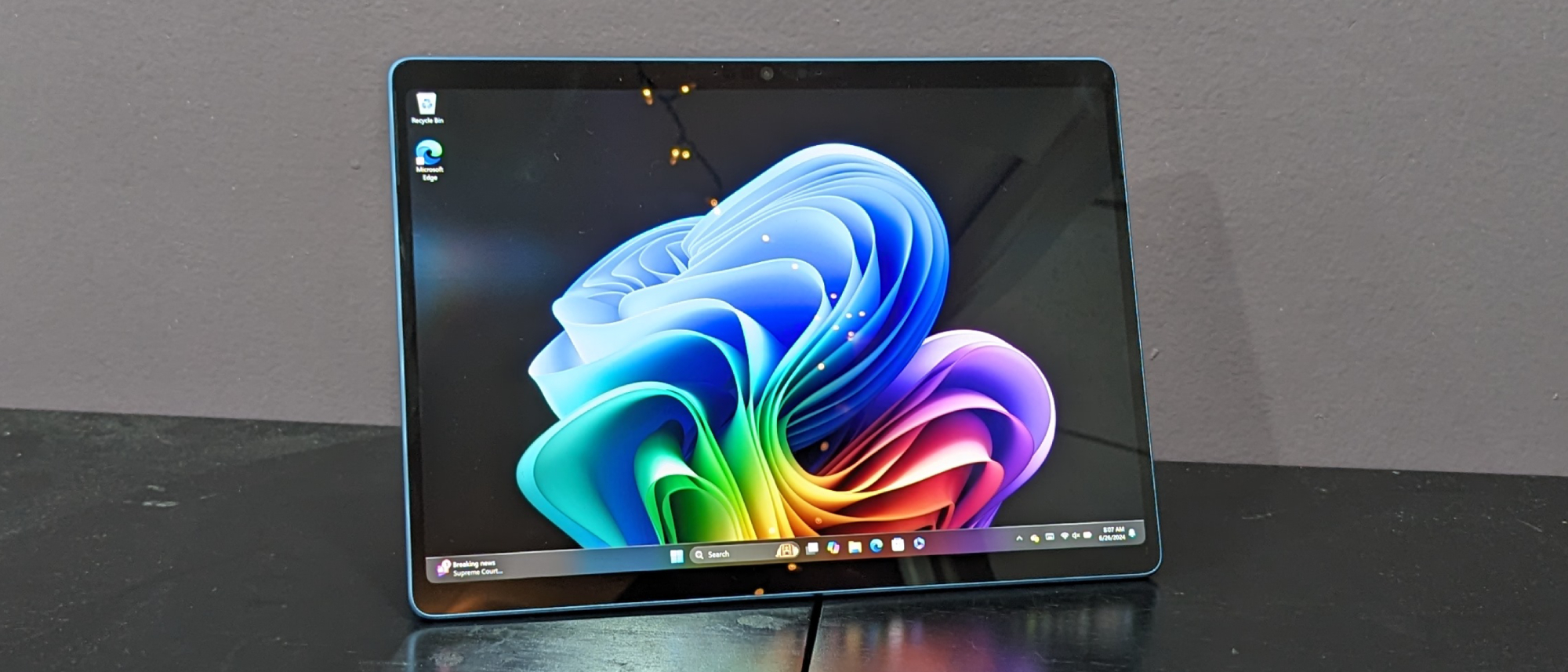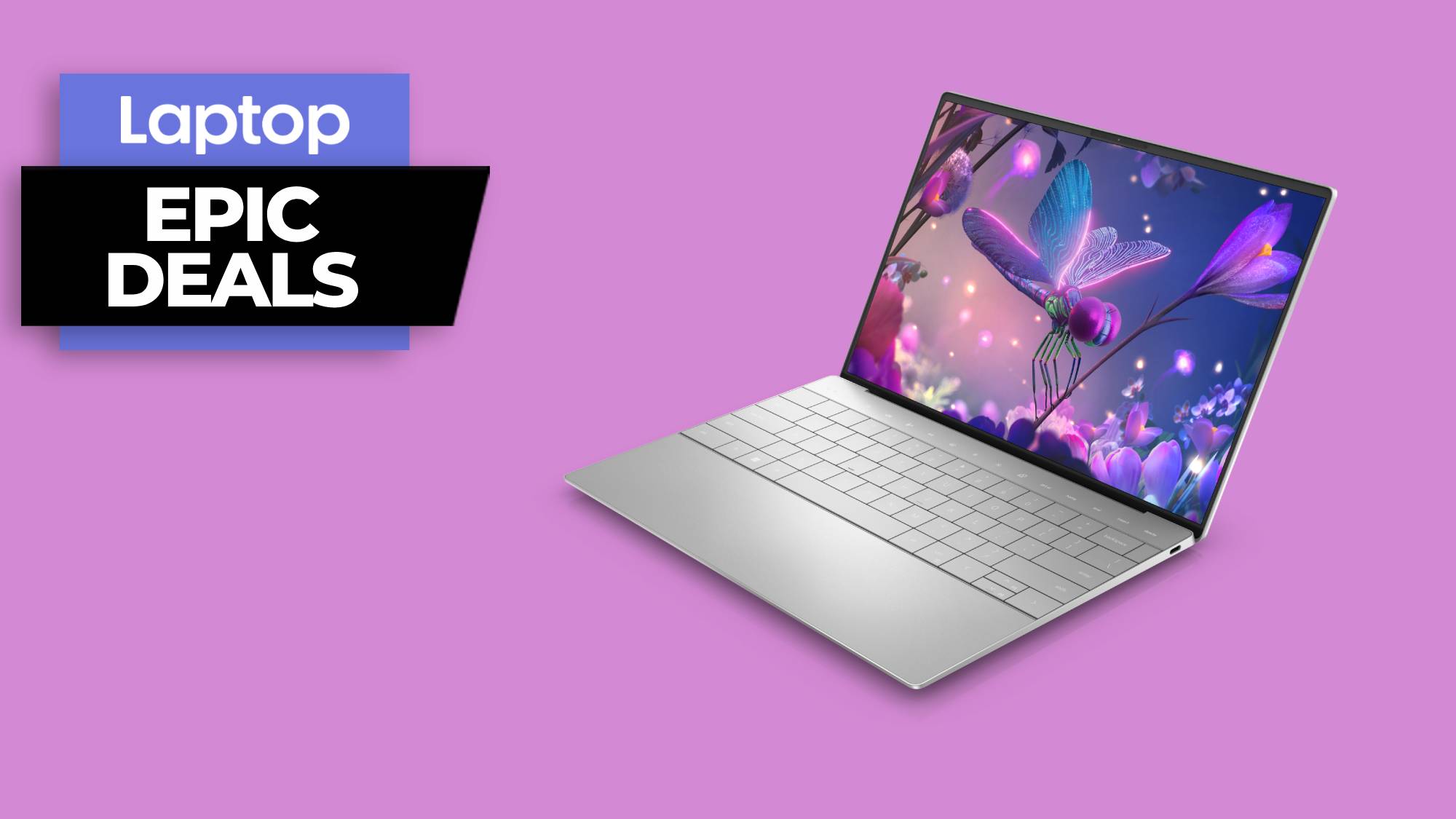Laptop Mag Verdict
The Microsoft Surface Pro (11th Edition) boasts excellent performance, long-lasting battery life, and a gorgeous display, but its high cost once adding the keyboard is hard to justify.
Pros
- +
Great performance
- +
Gorgeous display
- +
Sturdy and thin
- +
Solid speakers
- +
Superb battery life
Cons
- -
Shallow keyboard
- -
Poor trackpad
- -
Lack of ports
- -
Expensive for just a tablet
Why you can trust Laptop Mag
Great in some ways, but is the high cost worth a glorified tablet?
The Microsoft Surface Pro (11th Edition) is one of the first Copilot+ AI PCs powered by the latest Qualcomm Snapdragon X Elite processors. For those who haven’t kept up with the excitement of these launches since they began on June 18, these laptops boast unique AI-powered features that other Windows 11 devices do not, alongside the promise of excellent performance and long-lasting battery life. But do these new chips actually deliver?
The Qualcomm Snapdragon X Elite chip is shaping up to be excellent with this showing, but most of my qualms come with the Surface Pro itself. Charging as much as nearly $2,000 (with the Flex keyboard attached) for what is essentially a glorified tablet running Windows 11 is a hard sell, regardless of its excellent display and performance. Keep reading to see if the Microsoft Surface Pro is right for you.
Microsoft Surface Pro (11th Edition): Specs
| Price | $999 starting, $1,499 tested, $1,949 with keyboard |
| CPU | Snapdragon X Elite X1E-80-100 |
| GPU | Qualcomm Adreno |
| RAM | 16GB |
| Storage | 512GB SSD |
| Display | 13-inch, 2,880 x 1,920p, OLED, 120Hz |
| Battery | 12:11 |
| Dimensions | 11.3 x 8.2 x 0.4 inches |
| Weight | 2 pounds |
Microsoft Surface Pro (11th Edition): Price and configuration
The Surface Pro we reviewed is available for $1,499 on Microsoft’s website. It is built with a Snapdragon X Elite X1E-80-100 processor, integrated Qualcomm Adreno graphics, 16GB of RAM, and 512GB of SSD storage. It also has a 13-inch, 2,880 x 1,920-pixel OLED display at a 120Hz refresh rate.
The base model features the weaker Snapdragon X Plus X1P-64-100 processor and an LCD screen starting at $999. While the base model is limited to 16GB of RAM and 512GB of SSD storage, the Snapdragon X Elite version can be configured with 32GB of RAM and 1TB of SSD storage.
If you plan to use the Surface Pro as a laptop regularly, you’ll want to purchase one of its attachable keyboards separately. The two available models are the basic Surface Pro Keyboard for $139, or the Surface Pro Flex for $349, which can be used wirelessly. The Surface Slim Pen is also purchasable for $129, but bundles are available on Microsoft’s website, alongside certain keyboards featuring pen storage.
Naturally, you can opt to just purchase one of the best keyboards and use that with the Surface Pro, it's a far cheaper option, but also far less convenient to tote with you.
The $1,499 model we reviewed plus the $449 Surface Pro Flex with Slim Pen combo brings the total cost to $1,949, which is expensive for what is effectively a Windows 11 tablet.
Microsoft Surface Pro (11th Edition): Design
It’s hard to call the Surface Pro a “laptop,” as the device itself is closer to a tablet like the iPad, with the only major difference being that it runs a desktop operating system.
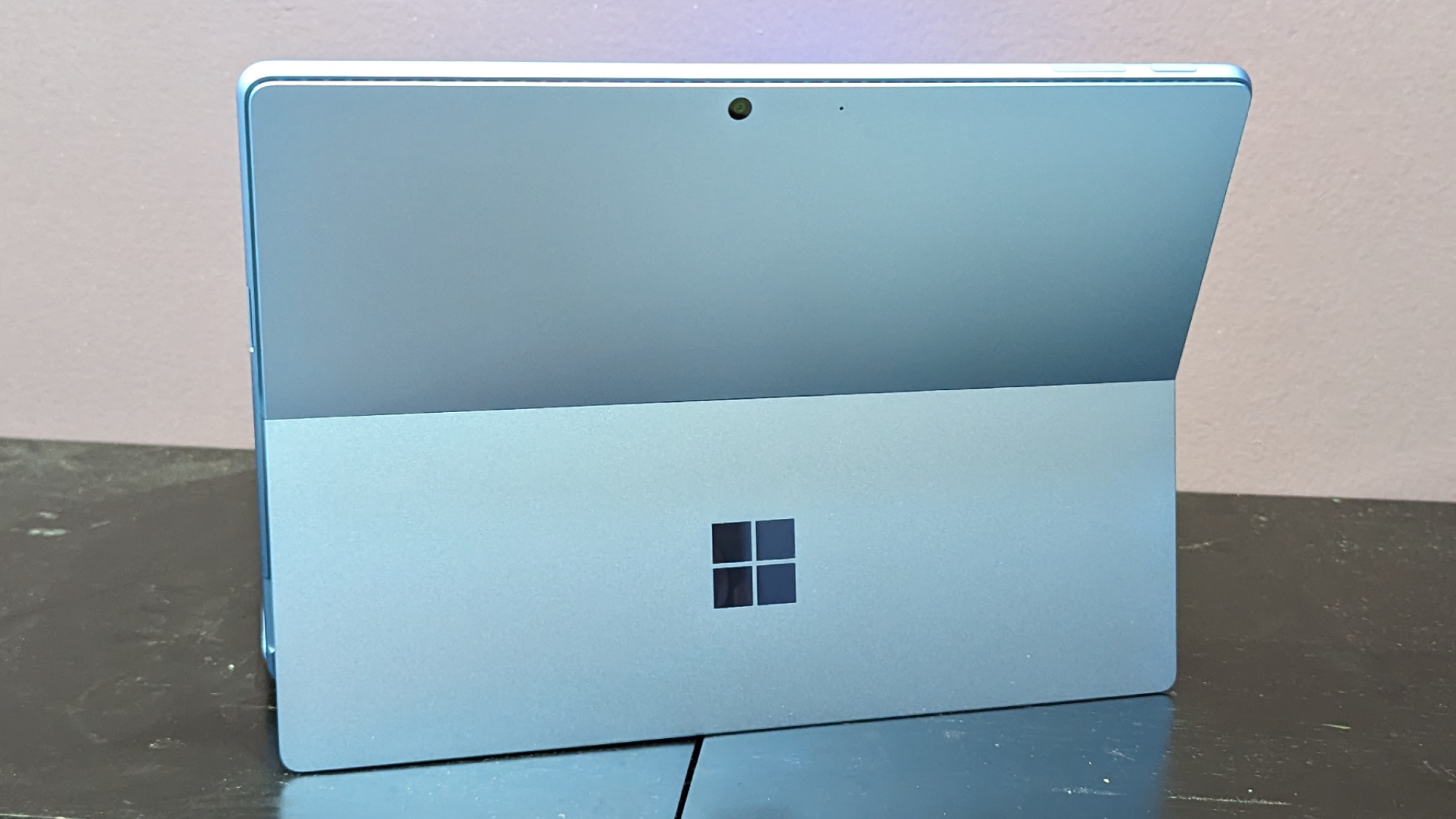
It’s available in Sapphire, Dune, Platinum, and Black color finishes. Our Sapphire tablet features a sturdy anodized aluminum casing. It has a wide stand at the bottom of the back that keeps it upright, alongside a volume and power button at the top.
The Surface Pro weighs two pounds and measures 11.3 x 8.2 x 0.4 inches on its own. The Flex Keyboard weighs 0.7 pounds and measures 11.4 x 8.7 x 0.2 inches. The full device, with the keyboard attached, weighs 2.7 pounds and is 0.6 inches thick. Competitors like the HP Spectre x360 16 (4.3 pounds, 14.1 x 9.7 x 0.8 inches), Lenovo Slim 7i Gen 9 (3.2 pounds, 12.3 x 8.7 x 0.6 inches), and Dell XPS 14 (3.7 pounds, 12.6 x 8.5 x 0.7 inches) are unsurprisingly heavier and thicker.
Microsoft Surface Pro (11th Edition): Ports
The Surface Pro has a lack of ports, which isn’t surprising considering the device is a tablet. Since there isn’t actually a deck (outside of a magnetically attachable keyboard), there isn’t room for anything beyond that.
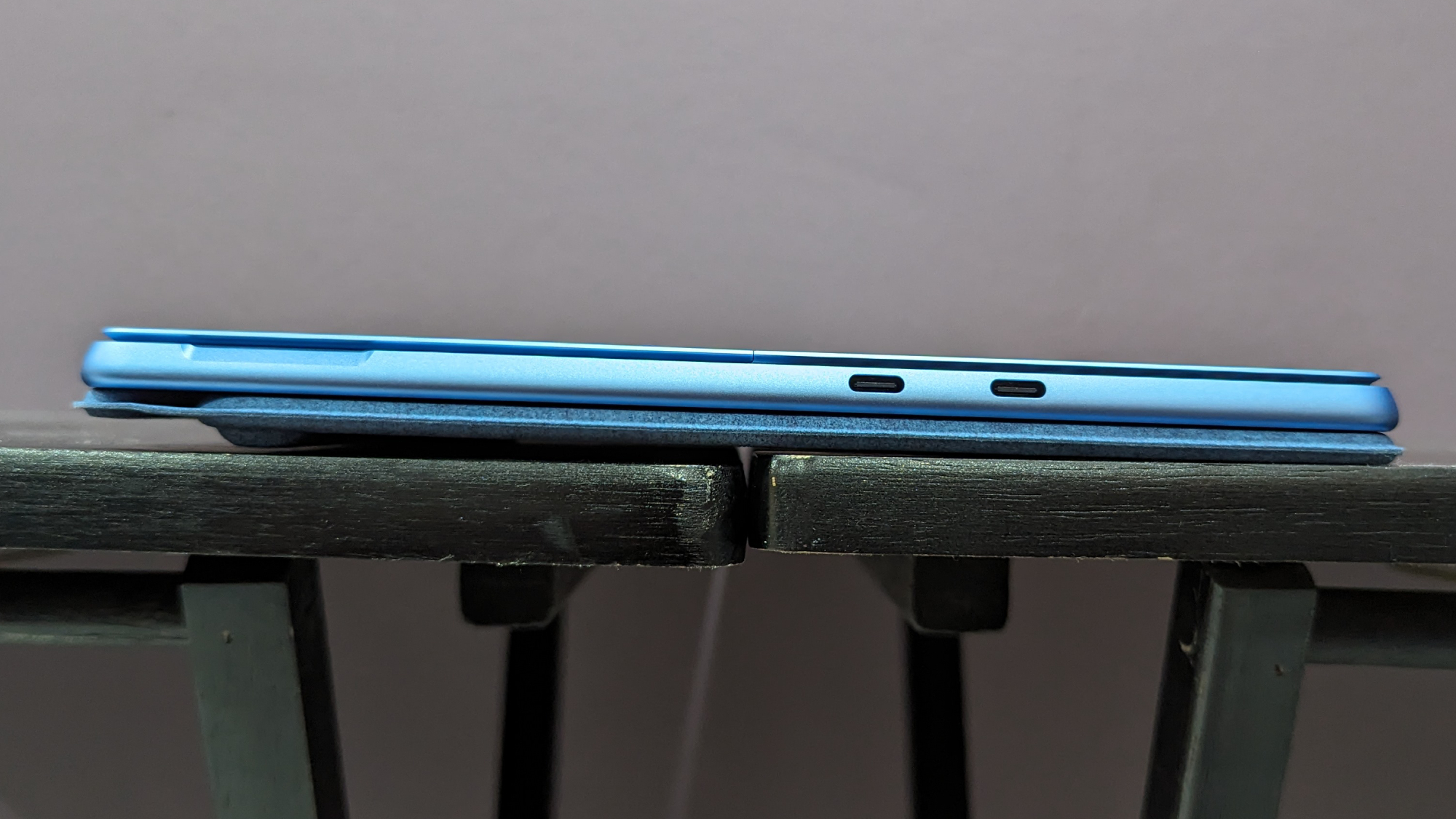
On its left side, it has two USB4 Type-C ports. That’s pretty much it, excluding the proprietary Microsoft Connect charging port on the right side. Why not Thunderbolt 4? This comes down to the Qualcomm Snapdragon X Elite chip inside, it's not Thunderbolt-certified. USB4 offers a fairly comparable feature set to Thunderbolt 4, Microsoft even states that its Surface Thunderbolt 4 Dock is supported.
If you need more ports consider our best laptop docking stations, just remember to look for USB4 support.
Microsoft Surface Pro (11th Edition): Display
You’ll have no issue using this device in bright spaces.
Microsoft has not disappointed with this bright, vibrant panel, built with a 13-inch, 2,880 x 1,920-pixel OLED display at a 120Hz refresh rate.
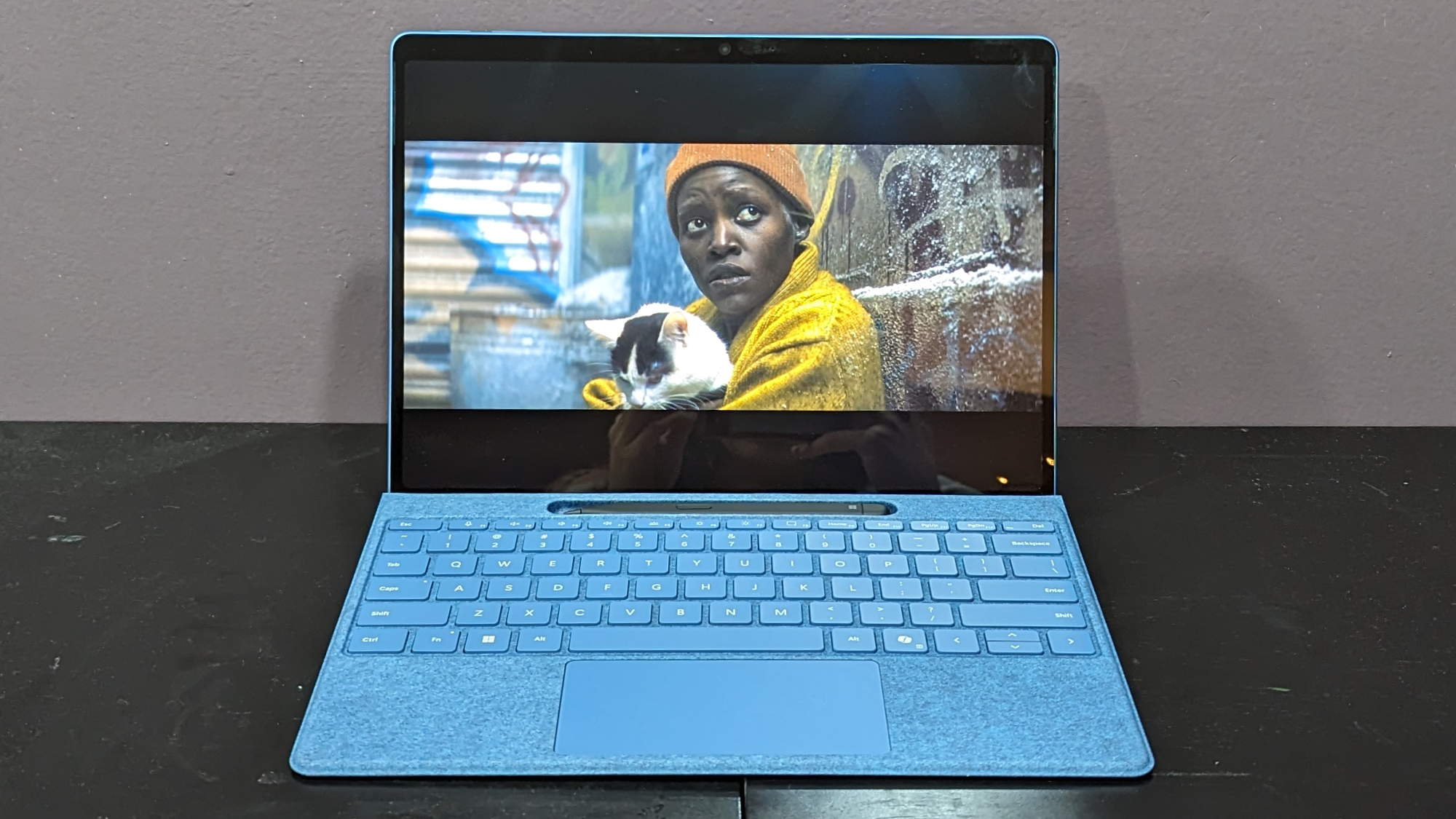
I watched the horror series prequel A Quiet Place: Day One trailer and was impressed by its drone shots of a derelict New York City. As explosive meteors fell from above, their bright orange glow contrasting against the blue sky looked stunning. Even during the trailer’s dimmest moments, where the protagonist is being taken down a stream in the dark corners of a sewer, the display’s high nits make the scene easily visible.
The Surface Pro did excellently on our color tests with its stunning OLED display, reproducing 115 percent of the DCI-P3 color gamut, far better than the 87 percent average for mainstream laptops. It’s no shock that the XPS 14 (65%) couldn’t compete with its IPS panel, but even the Spectre x360 (87%) fell behind with its OLED screen. The Slim 7i’s (134%) OLED scored far higher.
| Laptop | DCI-P3 color gamut | Display brightness |
|---|---|---|
| Microsoft Surface Pro | 115% | 564 nits |
| HP Spectre x360 16 | 87% | 376 nits |
| Lenovo Slim 7i Gen 9 | 134% | 382 nits |
| Dell XPS 14 | 65% | 461 nits |
Brightness is especially important for a 2-in-1 laptop of this kind, as its lithe build makes it ideal for bringing on the go. On our brightness tests, it hit a peak of 564 nits on average, which is significantly greater than the 399 nit category average. You’ll have no issue using this device in bright spaces.
OLED panels are notorious for having issues maintaining high brightness, but Microsoft scoffs at that expectation. The Spectre x360 (376 nits), Slim 7i (382 nits), and XPS 14 (461 nits) are more than 100 nits dimmer.
Microsoft Surface Pro (11th Edition): Audio
While the Surface Pro’s speakers aren’t the clearest, I was impressed by their fullness when testing them with music and film.
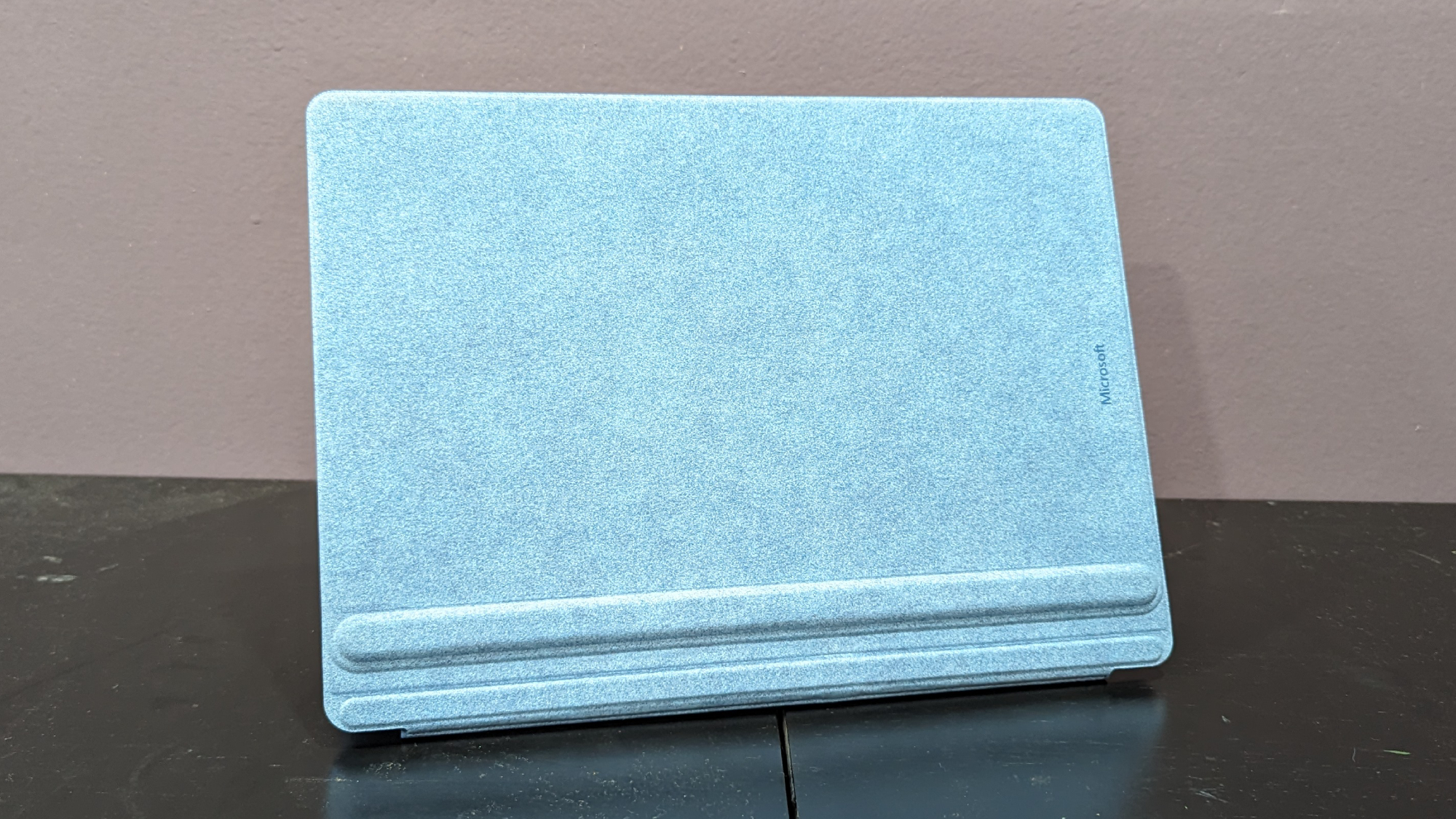
I started listening to Ariana Grande's pop hit “The Boy Is Mine” and was overwhelmed by the Surface Pro’s loudness. Keeping the volume at around 60 to 70 when listening to music in my office was perfect, but the option to get louder is there for those who need it. While vocals are prioritized slightly over the background percussion, they sound impactful and clear.
I was stunned by the trailer for A Quiet Place: Day One, thanks to how crisp, loud, and punchy the Surface Pro presented it. Dialogue remained clear, and when intense musical stings or explosive sound effects like glass shattering played in between dialogue, it boasted a near-perfect, immersive balance.
Microsoft Surface Pro (11th Edition): Keyboard and trackpad
The keys on the Surface Pro Flex are hollow and lack clickiness; my palms never felt supported.
The Surface Pro does not have a deck, so we tested the Surface Pro Flex keyboard accessory. It features a nook for the Surface Slim Pen, key backlight, the Copilot key, and can be detached to use the keyboard wirelessly.
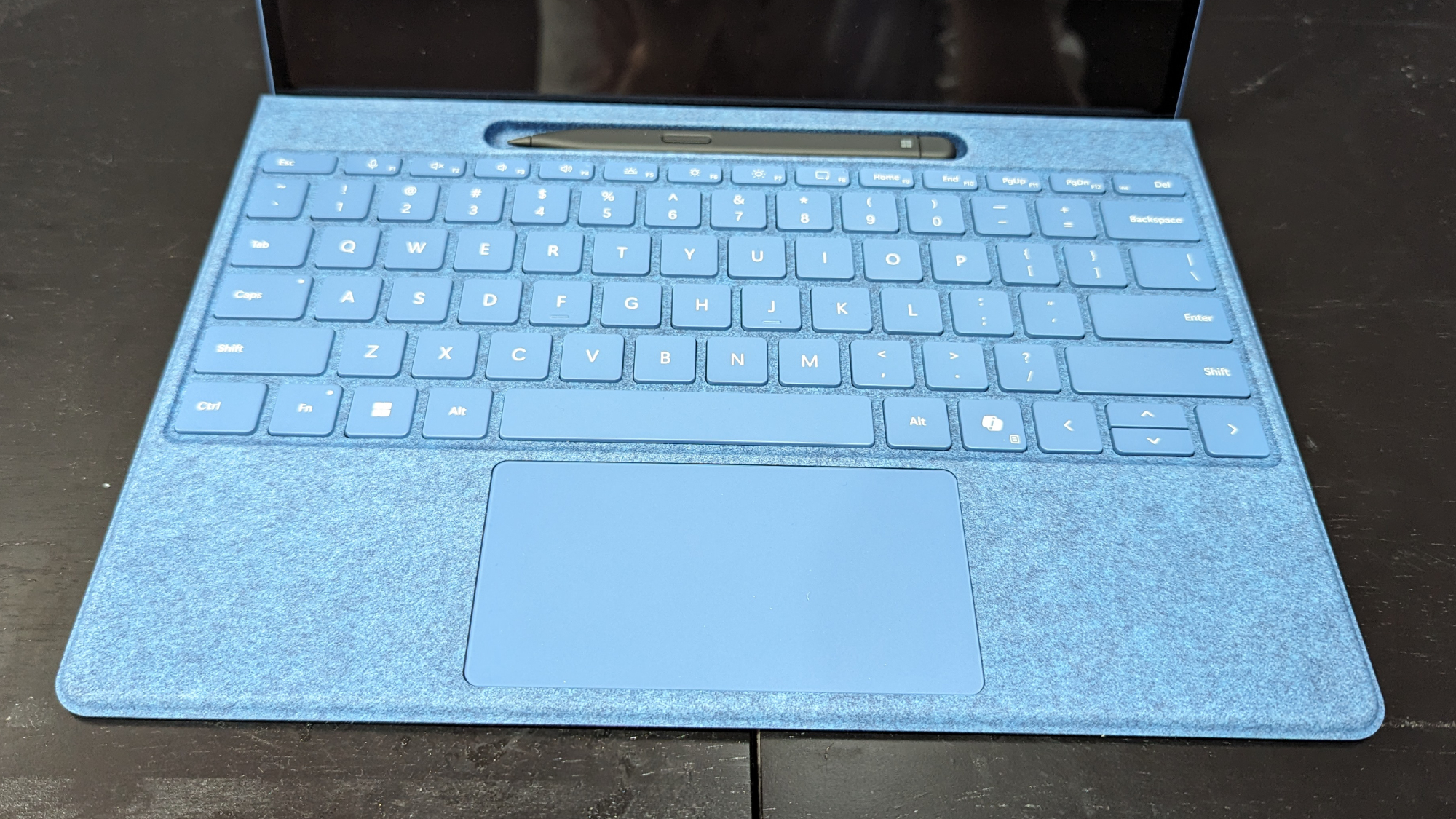
The wireless connection is seamless. You simply attach the keyboard magnetically, and once it’s detached, it’ll continue working. While there is no physical indicator of battery life on the device itself, you can go into Windows 11 settings to see how much juice it has left.
I took the 10fastfingers typing test and managed 72 words per minute with an 88 percent accuracy rate. I can normally score around 110 words per minute with a 99 percent accuracy rate on my mechanical keyboard, but it’s no surprise that the Alcantara (a specific blend of polyester and polyurethane) attachable accessory cannot successfully emulate the smoothness of a proper deck. The keys on the Surface Pro Flex are hollow and lack clickiness; my palms never felt supported.
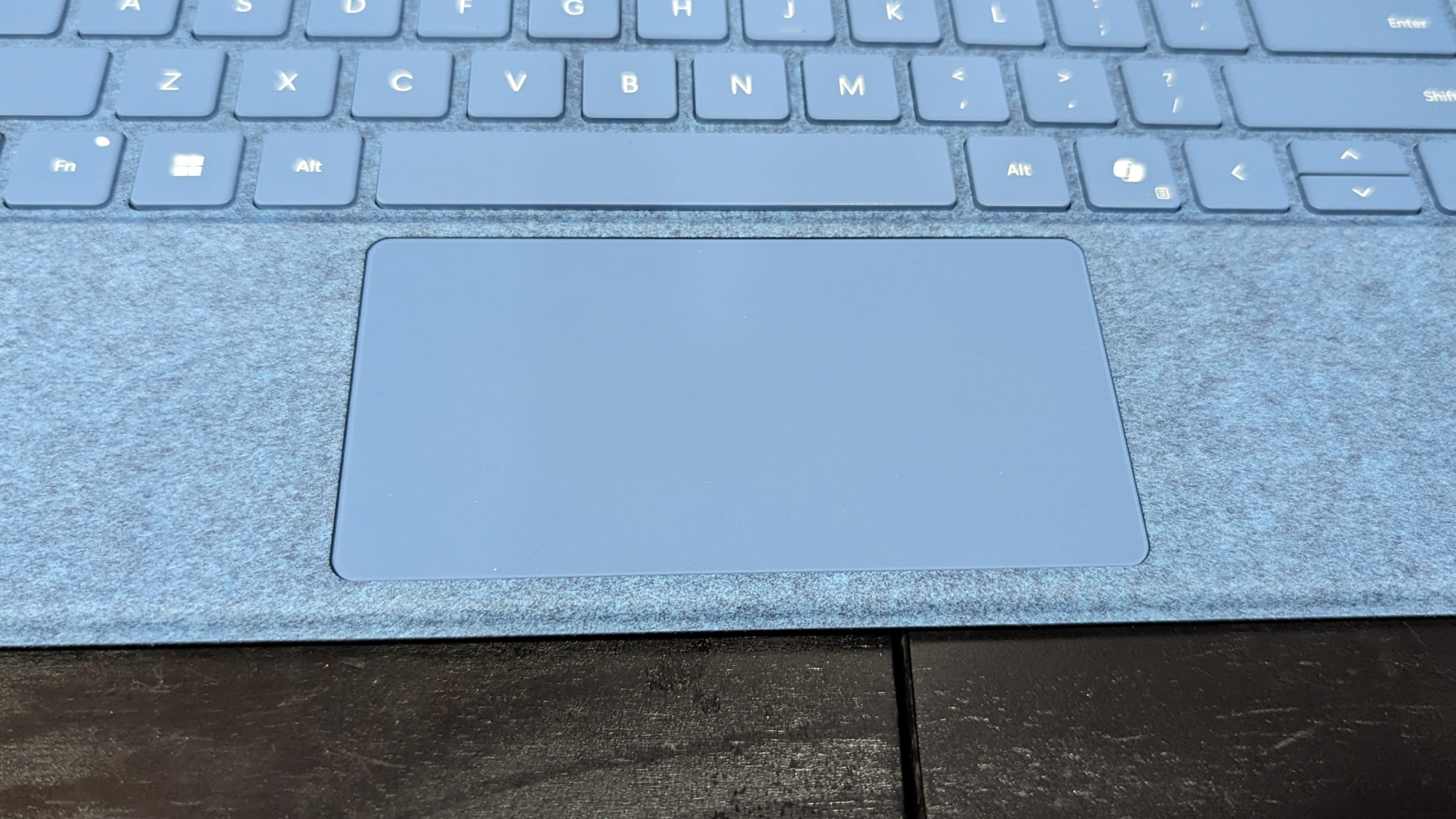
The Surface Flex’s trackpad is its greatest weakness, as there’s barely a recognizable difference between clicking down and not. If it is disconnected from the Surface Pro, clicking and dragging across the trackpad has so much friction that it causes the whole accessory to glide across my desk. An external wireless mouse is a must-have with the Surface Pro.
Microsoft Surface Pro (11th Edition): Performance
The latest Snapdragon X Elite processors powering Copilot+ PCs promise new levels of performance and improved battery life, and we’re already seeing these results from our tests. The Surface Pro is built with a Snapdragon X Elite X1E-80-100 CPU, 512GB of SSD storage, and 16GB of RAM.
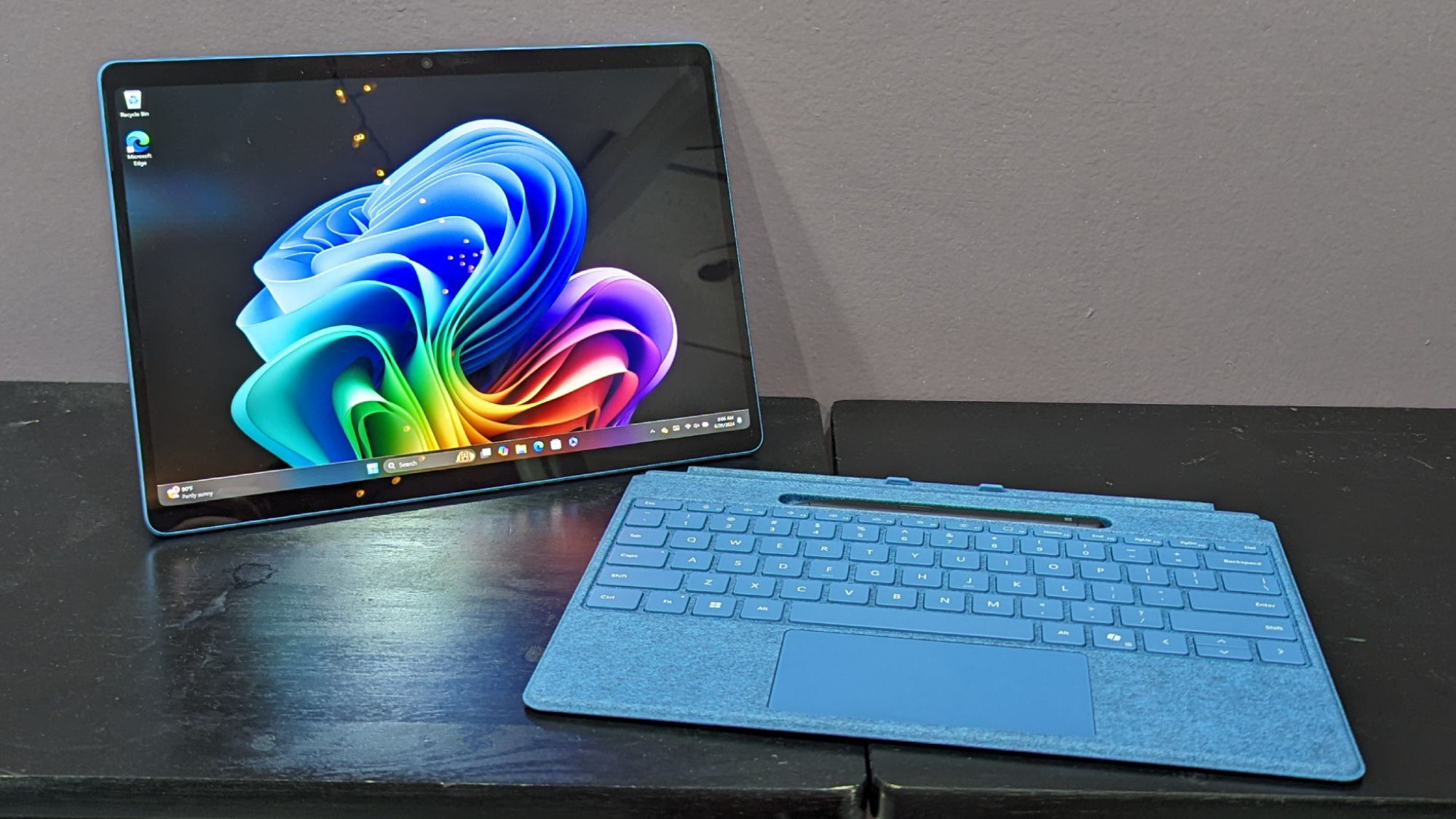
On the Geekbench 6.3 overall performance test, the Surface Pro’s multi-core score of 14,432 is incredible — especially when compared to its competitors, which all feature Intel Meteor Lake processors. The Surface Pro’s multi-core score is better than the category average of 10,161. Meanwhile the HP Spectre x360 (Intel Core Ultra 7 155H, 12,592), Lenovo Slim 7i (Intel Core Ultra 7 155H, 12,111), and Dell XPS 14 (Intel Core Ultra 7 155H, 12,711) achieved closer scores.
| Laptop | Geekbench 6.3 | Handbrake time | SSD Write speed |
|---|---|---|---|
| Microsoft Surface Pro | 14,432 | 5:21 | 1,001Mbps |
| HP Spectre x360 16 | 12,592 | 8:56 | 1,805Mbps |
| Lenovo Slim 7i Gen 9 | 12,111 | 5:21 | 1,534Mbps |
| Dell XPS 14 | 12,711 | 5:44 | 1,503Mbps |
While converting a 4K video into 1080p using the HandBrake app, the Surface Pro accomplished the task in 5 minutes and 21 seconds, which is better than the 7-minute and 59-second category average. The Spectre x360 (8:56) performed this task significantly slower, while the Slim 7i (5:21) and XPS 14 (5:44) were similar.
The Surface Pro duplicated 25GB of multimedia files in 26 seconds at a transfer rate of 1,001 megabytes per second, which was a disappointing result that’s 15 percent slower than the 1,152 Mbps category average. The Spectre x360 (1TB SSD, 1,805Mbps), Slim 7i (1TB SSD, 1,534Mbps), and XPS 14 (512GB SSD 1,503Mbps) all completed the transfer far faster.
Microsoft Surface Pro (11th Edition): AI performance and features
As one of the many newly launched Copilot+ PCs, we tested the Surface Pro’s AI performance with its Snapdragon X Elite X1E-80-100 processor. We’ve previously covered how we test AI PCs, but these tests are still in their earliest stages, so our approach may shift as our testing process and the AI tests themselves evolve.
On the Geekbench ML 0.6 AI performance test, the Surface Pro achieved an ONNX/CPU score of 2,859. That’s behind some of its older competitors like the HP Spectre x360 (2,951), Lenovo Slim 7i (2,946), and Dell XPS 14 (2,992). This could be a result of Geekbench ML 0.6 not being optimized for Qualcomm’s Snapdragon X Elite chips yet, but the test is also not purely targeting the NPU, which is where Qualcomm’s chip has a significant advantage over the current generations of Intel, AMD, and Apple chips.
| Laptop | Geekbench ML 0.6 |
|---|---|
| Microsoft Surface Pro | 2,859 |
| HP Spectre x360 16 | 2,951 |
| Lenovo Slim 7i Gen 9 | 2,946 |
| Dell XPS 14 | 2,992 |
Copilot+ PCs feature unique benefits other laptops don’t have, with Surface Pro’s architecture allowing it to perform the latest and upcoming AI features.
Recall is one such feature; the device creates a personal history of what the user has accessed in the past, whether that be applications, websites, documents, or more. Users can then go back in time in an instant and see what they were looking at earlier. All of the information is stored locally — not in the cloud — and can be modified by the user if they don’t want the computer to save certain information. This feature is currently limited to users in the Windows Insider program due to some backlash following its announcement.
Other AI features include AI-powered image generation in the Paint/Photos app, alongside further compatibility with applications like Adobe, DaVinci Resolve, CapCut, and more. We rounded up our favorite Copilot+ PC features if you want a glimpse at everything these AI PCs have to offer.
Microsoft Surface Pro (11th Edition): Graphics
The Surface Pro is not a gaming laptop, but we tested it to see how it would handle it. The tests indicate that Qualcomm’s Snapdragon X Elite processors aren’t the best at meeting the demands of gaming.
On the 3DMark FireStrike synthetic graphics benchmark, our Microsoft Surface Pro scored 5,743, which is worse than the mainstream laptop average of 6,976. The Lenovo Slim 7i (8,455) did a bit better, but the Dell XPS 14 (12,932) managed a score far beyond either. The HP Spectre x360 (1,314) put up one of the worst scores we've seen.
During the Sid Meier’s Civilization VI: Gathering Storm test at 1080p, it achieved an average of 21 frames per second. Not only is this below our 30 fps playability minimum, but it's less than half the category average of 44 fps. The HP Spectre x360 (61 fps), Lenovo Slim 7i (41 fps), and Dell XPS 14 (88 fps) performed miles better.
Microsoft Surface Pro (11th Edition): Battery life
Qualcomm’s Snapdragon X Elite processors are believed to massively boost longevity, with Qualcomm’s official website promising up to 22 hours of battery life and Microsoft also claiming the Surface Pro will last up to 14 hours when playing videos. These are big claims, and while Laptop Mag’s tests don’t reflect numbers that high (our test is more rigorous than just looping video), it’s still pretty impressive to see what the Snapdragon X Elite can do.
| Laptop | Battery life test result (hours and minutes) |
|---|---|
| Microsoft Surface Pro | 12:11 |
| HP Spectre x360 16 | 11:07 |
| Lenovo Slim 7i Gen 9 | 10:03 |
| Dell XPS 14 | 10:09 |
On the Laptop Mag battery life test, which involves continuous web browsing over wifi at 150 nits, the Surface Pro lasted 12 hours and 11 minutes. Eight hours is our bottom floor on non-gaming laptops, and we typically recommend around 10 hours, so that’s an incredible number for the Surface Pro. It’s also way above the category average of 10 hours and 5 minutes. Competitors like the Spectre x360 (11:07), Slim 7i (10:03), and XPS 14 (10:09) performed well but couldn’t touch the Surface Pro.
Microsoft Surface Pro (11th Edition): Cameras
Since the Surface Pro is more comparable to a tablet, it features a camera on both sides of the device. Its front camera is a 3440 x 1440-pixel Quad HD camera with an ultrawide field of view, while its rear-facing camera is 10MP at 4064 x 2286-pixel resolution. I was blown away by both cameras.
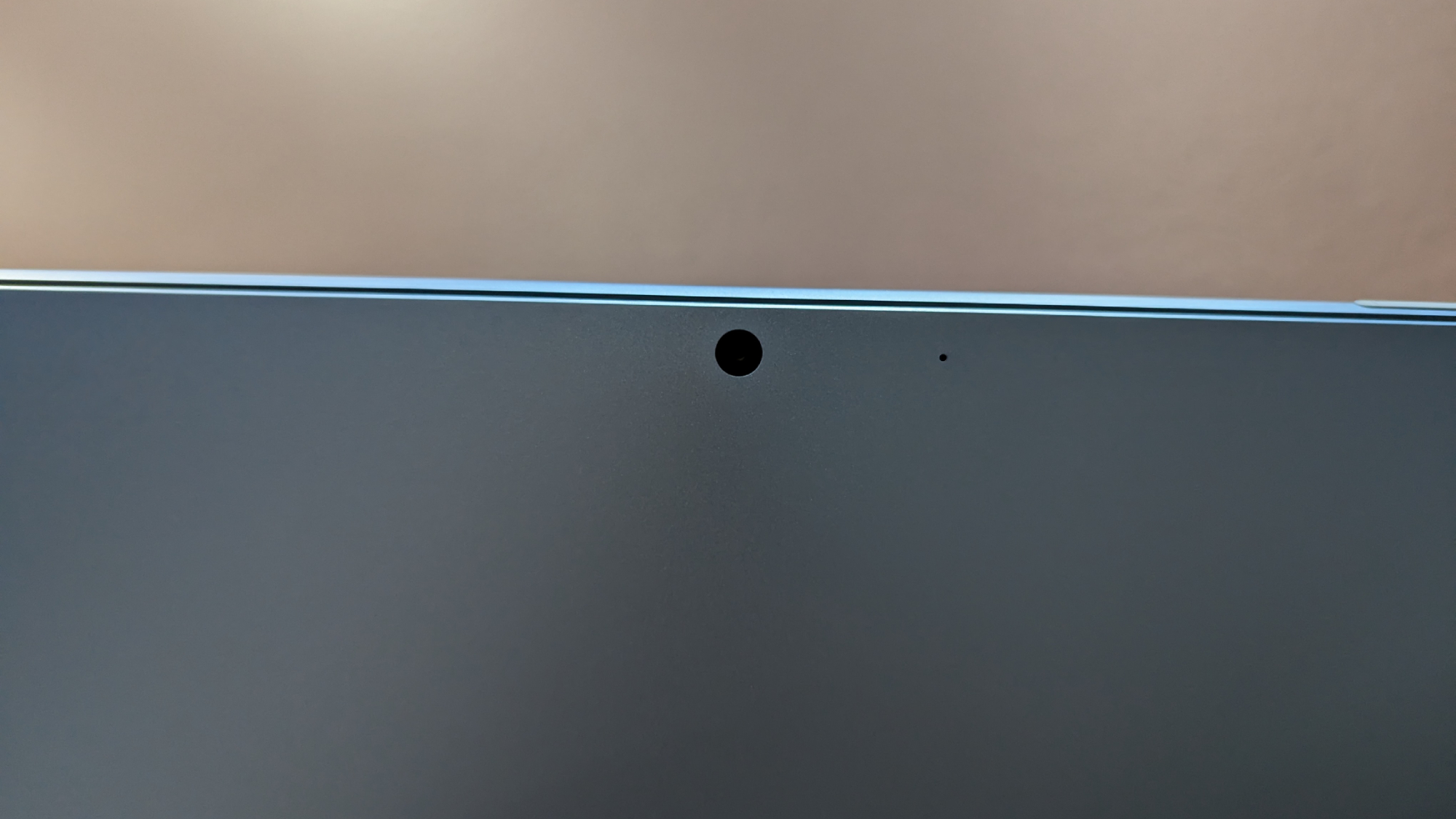
I took a photo of myself on its ultrawide front camera. The details of my office were crisp. Not only could I see the bags under my eyes as a result of numerous late night movie binges, but I could nearly read the text appearing on my computer screen and had no issue making out the details of the several posters on my wall.
I took another photo on the rear-facing camera and was fully able to make out the text on my computer screen alongside the finer details of the art on my wall. You won’t need to invest in the best webcams for the Surface Pro, as it already has one.
Microsoft Surface Pro (11th Edition): Heat
We normally test a laptop’s heat levels on its keyboard and touchpad, but since the Surface Pro doesn’t actually have a deck, that’s not possible. I can confirm that using the Pro Flex keyboard is completely cool and there’s no need to worry about heat there. As for the bottom of the tablet, it reached 107 degrees, so the Surface Pro can get pretty toasty.
Microsoft Surface Pro (11th Edition): Software and warranty
Laptops manufactured by third parties typically boast additional applications alongside being installed with Windows 11, but since this is a Microsoft laptop, you’re not getting much beyond everything that comes with Windows. The only exceptions are the benefits of it being a Copilot+ PC, which comes with the AI features referenced above.
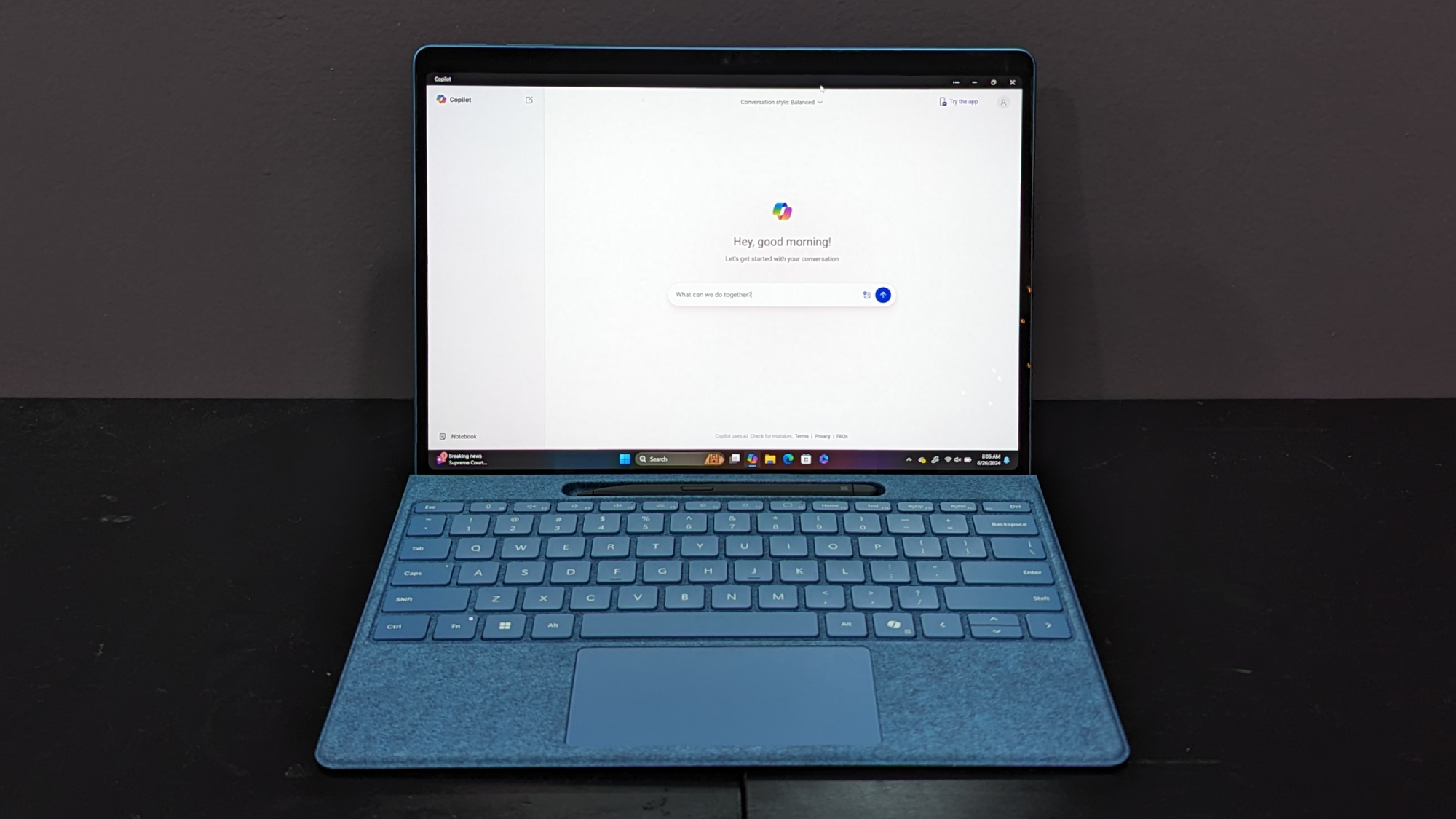
The Surface Pro comes with a one-year limited hardware warranty. You can see how Microsoft did in our Tech Support Showdown special report.
Bottom line
The Microsoft Surface Pro (11th Edition) is excellent in many regards, but it’s hard to recommend at this cost when other devices provide a comparable full laptop for considerably less than this $2,000 price tag.
However, if you’re OK with spending that much on what is effectively a tablet running Windows 11, the Surface Pro boasts a stunning OLED panel, excellent performance metrics, long-lasting battery life, and a punchy speaker system. In many areas that matter a lot to consumers, it’s a premium device.
The Lenovo Slim 7i Gen 9 is an excellent alternative for around $700 cheaper, but if the Surface Pro sounds like the 2-in-1 for you, it’s still a great device if you can stomach its price.

Self-described art critic and unabashedly pretentious, Claire finds joy in impassioned ramblings about her closeness to video games. She has a bachelor’s degree in Journalism & Media Studies from Brooklyn College and five years of experience in entertainment journalism. Claire is a stalwart defender of the importance found in subjectivity and spends most days overwhelmed with excitement for the past, present and future of gaming. When she isn't writing or playing Dark Souls, she can be found eating chicken fettuccine alfredo and watching anime.
